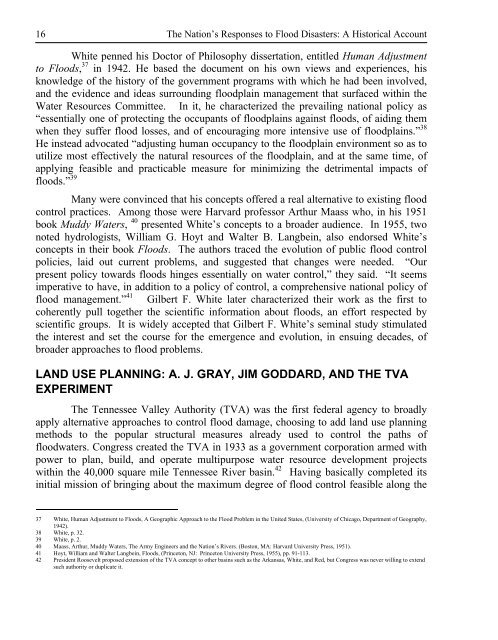The Nation's Responses To Flood Disasters: A Historical Account
The Nation's Responses To Flood Disasters: A Historical Account
The Nation's Responses To Flood Disasters: A Historical Account
Create successful ePaper yourself
Turn your PDF publications into a flip-book with our unique Google optimized e-Paper software.
16<br />
<strong>The</strong> Nation’s <strong>Responses</strong> to <strong>Flood</strong> <strong>Disasters</strong>: A <strong>Historical</strong> <strong>Account</strong><br />
White penned his Doctor of Philosophy dissertation, entitled Human Adjustment<br />
to <strong>Flood</strong>s, 37 in 1942. He based the document on his own views and experiences, his<br />
knowledge of the history of the government programs with which he had been involved,<br />
and the evidence and ideas surrounding floodplain management that surfaced within the<br />
Water Resources Committee. In it, he characterized the prevailing national policy as<br />
“essentially one of protecting the occupants of floodplains against floods, of aiding them<br />
when they suffer flood losses, and of encouraging more intensive use of floodplains.” 38<br />
He instead advocated “adjusting human occupancy to the floodplain environment so as to<br />
utilize most effectively the natural resources of the floodplain, and at the same time, of<br />
applying feasible and practicable measure for minimizing the detrimental impacts of<br />
floods.” 39<br />
Many were convinced that his concepts offered a real alternative to existing flood<br />
control practices. Among those were Harvard professor Arthur Maass who, in his 1951<br />
book Muddy Waters, 40 presented White’s concepts to a broader audience. In 1955, two<br />
noted hydrologists, William G. Hoyt and Walter B. Langbein, also endorsed White’s<br />
concepts in their book <strong>Flood</strong>s. <strong>The</strong> authors traced the evolution of public flood control<br />
policies, laid out current problems, and suggested that changes were needed. “Our<br />
present policy towards floods hinges essentially on water control,” they said. “It seems<br />
imperative to have, in addition to a policy of control, a comprehensive national policy of<br />
flood management.” 41 Gilbert F. White later characterized their work as the first to<br />
coherently pull together the scientific information about floods, an effort respected by<br />
scientific groups. It is widely accepted that Gilbert F. White’s seminal study stimulated<br />
the interest and set the course for the emergence and evolution, in ensuing decades, of<br />
broader approaches to flood problems.<br />
LAND USE PLANNING: A. J. GRAY, JIM GODDARD, AND THE TVA<br />
EXPERIMENT<br />
<strong>The</strong> Tennessee Valley Authority (TVA) was the first federal agency to broadly<br />
apply alternative approaches to control flood damage, choosing to add land use planning<br />
methods to the popular structural measures already used to control the paths of<br />
floodwaters. Congress created the TVA in 1933 as a government corporation armed with<br />
power to plan, build, and operate multipurpose water resource development projects<br />
within the 40,000 square mile Tennessee River basin. 42 Having basically completed its<br />
initial mission of bringing about the maximum degree of flood control feasible along the<br />
37 White, Human Adjustment to <strong>Flood</strong>s, A Geographic Approach to the <strong>Flood</strong> Problem in the United States, (University of Chicago, Department of Geography,<br />
1942).<br />
38 White, p. 32.<br />
39 White, p. 2.<br />
40 Maass, Arthur, Muddy Waters, <strong>The</strong> Army Engineers and the Nation’s Rivers. (Boston, MA: Harvard University Press, 1951).<br />
41 Hoyt, William and Walter Langbein, <strong>Flood</strong>s, (Princeton, NJ: Princeton University Press, 1955), pp. 91-113.<br />
42 President Roosevelt proposed extension of the TVA concept to other basins such as the Arkansas, White, and Red, but Congress was never willing to extend<br />
such authority or duplicate it.
















